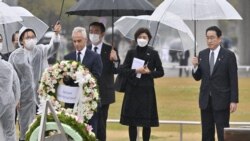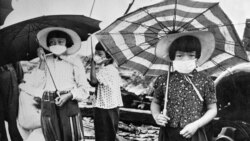On May 20, the Hiroshima Municipal Government announced it would not invite Russian President Vladimir Putin to a remembrance for the 77th anniversary of the U.S. atomic bomb attack on the city in WWII.
The reason: Russia’s invasion of Ukraine.
“We are concerned that the ceremony would stray from its original spirit of 'commemoration,'” the city said in a statement.
In response, on May 25, Russia’s ambassador in Japan, Mikhail Galuzin, called the dis-invite a “shameful” move. Galuzin attacked Japan for not being more critical of its ally, the United States, for the 1945 bombing.
Then, Galuzin went further – accusing Japan of “shamelessly spread[ing] the ridiculous myth that Russia intends to use nuclear weapons in Ukraine.”
“Organizers should know that we must eradicate the Nazism promoted by Western groups in Ukraine,” Galuzin stated. “Forming an alliance with this Nazism was one of the causes of the catastrophe that struck Japan as a whole in 1945.”
The claim that Japan said Russia intends to use nuclear weapons in Ukraine is false. So is the assertion that Western-Japan opposition to Russia’s war is equivalent to Japan siding with German Nazis in the Second World War.
The statement sticks to the script of Russia disinformation about the Ukraine war, which leverages WWII history to falsely paint it as a war against fascism.
No Western groups are promoting Nazism in Ukraine, nor is the Ukraine government fascist or controlled by Nazis, as Russian disinformation claims.
Imperial Japan was allied with Nazi Germany and fascist Italy during the Second World War. The Soviet Union was a part of the grand alliance, along with Great Britain and the United States, that defeated Germany and Japan.
However, the Soviet Union was initially allied with Nazi Germany through a non-aggression pact, as Polygraph.info and others have previously reported.
On August 6, 1945, the United States became the only country to use nuclear weapons during war when it dropped an atomic bomb on Hiroshima. The controversial attack killed 70,000 to 135,000 people.
The United States dropped a second atomic bomb on August 9, 1945, this time on the city of Nagasaki. Imperial Japan surrendered on August 15, 1945. Some argue Japan’s surrender was spurred by the Soviet Union’s decision to enter the war against it, and not the use of the atomic bombs.
In any case, all of that is past. Modern-day Japan, which constitutionally outlaws war, long maintains the “Three Non-Nuclear Principles” of not possessing, producing or permitting the introduction of nuclear weapons onto its soil, in line with the country’s constitution.
Japan has condemned Russia’s invasion of Ukraine and provided Ukraine with non-lethal military equipment. Japan has also joined its Western partners in ratcheting up sanctions against Russia because of its aggression in Ukraine, provoking Moscow’s ire.
Russia and Japan have a territorial dispute over ownership of the four southernmost Kuril Islands, which Soviet forces seized near the end of WWII. That dispute has kept the two countries from signing a peace treaty 77 years on.
Putin has increasingly used the Soviet Union’s victory in WWII – central to Russia’s national identity – to justify Russia’s foreign policy objectives in Ukraine.
But as Polygraph.info has reported, Putin's references to the “Nazi usurpation” in Ukraine and the need for Ukraine’s “de-nazification” are based on falsehoods.
Russia has regularly cited the presence of far right activists and nationalists in Ukraine’s Azov Regiment, an all-volunteer unit formed to fight Russia’s clandestine invasion of Ukraine in 2014. Ukraine says the Azov Regiment was de-politicized and incorporated into the National Guard in November 2014.
The Azov Regiment represents a small fraction of Ukraine’s total military forces. Moreover, far-right activists lack even a toehold in Ukraine politics. All of Ukraine’s far-right political organizations united for the 2019 parliamentary elections, but still only won 2.15% of the vote – not enough to gain a single seat.
Ukraine President Volodymor Zelenskyy is Jewish; his great-grandfather and three great-uncles were killed in the Nazi Holocaust during WWII.
Zelenskyy received 73 percent of the vote in 2019 elections.
In any case, Russia itself has a far-right problem. Germany’s Der Spiegel news website, citing a report from Germany's Federal Intelligence Service (BND), noted that “numerous neo-Nazis are fighting for Russia in Ukraine.”
Japan did not “spread the ridiculous myth” that Russia intends to use nuclear weapons in Ukraine. However, Japan’s Prime Minister Fumio Kishida did say in March that “the possible use of nuclear weapons by Russia is increasingly real.”
That follows bellicose rhetoric by Russian officials and state media on the matter.
While Putin has not explicitly threatened to use nuclear weapons, he warned that anyone who got in Russia’s way in Ukraine would face “such consequences that you have never encountered in your history.”
Some leaders took that statement as a nuclear threat, Reuters reported.
Since Russia launched its full-scale invasion of Ukraine on February 24, Russian state media has repeatedly threatened European countries with nuclear attacks.
Russia’s former president and prime minister, Dmitry Medvedev, who is currently deputy chairman of the Russian Security Council, said Western assistance to Ukraine increased “the likelihood of a direct and open conflict between NATO and Russia.”
“Such a conflict always has the risk of turning into a full-fledged nuclear war,” he added.
Putin’s spokesperson, Dmitry Peskov, told CNN International in a March interview about the war that Russia could use nuclear weapons if faced with an “existential threat.”
It remains unclear whether Moscow views losing the war in Ukraine as an existential threat.
Pentagon Press Secretary John Kirby condemned Peskov's “dangerous” comments, and U.S. intelligence sources say it is unlikely that Russia will go nuclear.
“Our view [is] that there is not sort of an imminent potential for Putin to use nuclear weapons,” said the U.S. Director of National Intelligence, Avril Haines.

